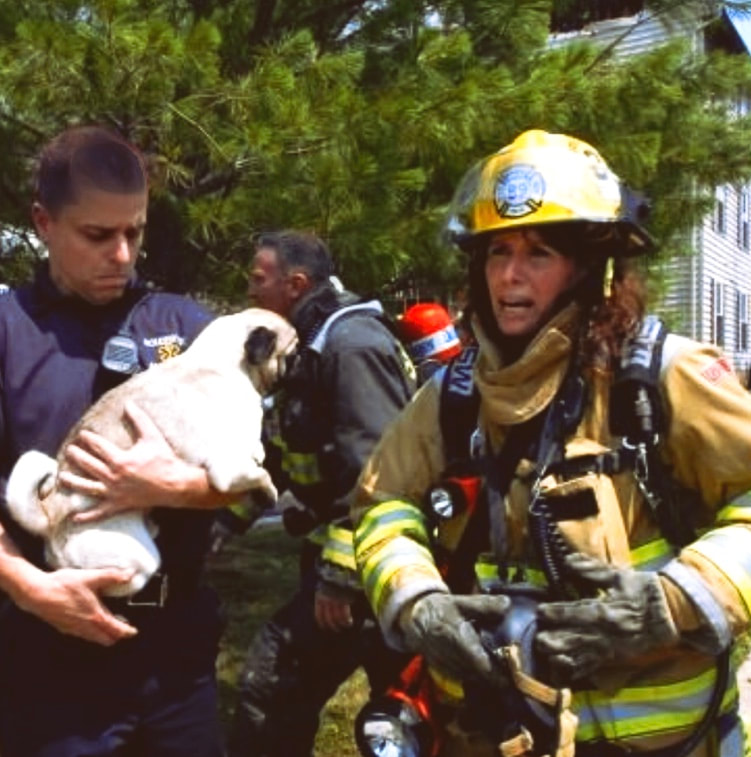|
By, Katy Cable -TWR A 4 min. Read It’s been a real “shake and bake” holiday! As if 4th of July fireworks sounding more like “bombs bursting in air” weren’t scary enough, here in SoCal we also had two of the largest earthquakes to hit in over 20 years. I figured this was a perfect time to remind everyone: NOW IS THE TIME TO PREPARE! If you’re a pet parent, that also means preparing for them too! Unlike most other natural disasters, earthquakes are sneaky and, as we just saw, don’t come with any warning. Total devastation can happen in a split second. Waiting until the last minute to have an emergency plan and supplies in place is not only foolish but may be deadly. So, BEFORE a crisis, while it's fresh on everyone's minds, I hope each and every one of you will take a few minutes and: Make a disaster plan for you AND your pets! ⚠️BEFORE THE BIG ONE HITS⚠️ Here are some important tips to keep pets safe in natural disasters and emergencies: 1. HAVE ALL YOUR PETS MICRO-CHIPPED and make sure they’re wearing ID collars when home alone. You'll increase your chances of being reunited with pets who get lost by having them micro-chipped; But remember, the “Good Samaritan” who finds your pet likely won't be able to scan for a chip, but they will be able to read a basic tag! *Put your cellphone number on your pet's tag. It may also be a good idea to include the phone number of a friend or relative outside your immediate area in the event you have to evacuate. 2. PREPARE AN EMERGENCY KIT FOR YOUR PETS: Include essentials such as: 🐾2 weeks of clean drinking water & non-perishable high quality dry pet food. Store in water-tight containers. 🐾Water purification tablets 🐾First aid kit 🐾Any medication your pet takes plus first-aid meds: (antacid/sm can pumpkin/Benadryl/baby aspirin) CBD oil (For Stress Relief) 🐾Crate labeled with photo of pet and ER contact # 🐾comfort toys/in crate 🐾booties or baby socks 🐾T-Shirt/warm coat/sweater/blanket/pillow 🐾reflective harness/leash 🐾Life preserver 🐾Puppy pads/poop bags 3. KEEP EMERGENCY KIT SUPPLIES IN YOUR CAR AS WELL AS YOUR HOME. If you live in LA, there’s a good chance you may be in your car or out and about. 4. Make sure there's a sign on your door for emergency personnel that you own pets and where they typically hide in the house if scared. 5. Anchor televisions, bookcases and armoires securely to walls. Be mindful of heavy or delicate objects that may fall onto a pet or small child during shaking. Organize accordingly. 6. Entrust a neighbor with a key who can get your pets in the event of an emergency and you’re away. Be sure the person is comfortable with your pets and your pets are familiar with them. Show them where your pets are likely to be (especially if they hide when they're nervous) and where your disaster supplies are kept. I like to keep a backpack in a small travel crate. ⚠️If you have a pet-sitter: Make a plan well in advance. Also discuss a specific meeting spot to retrieve your pets should there be an emergency evacuation. 7. LOCATE A SAFE AREA IN YOUR HOME. If your family and pets must wait out a storm or an earthquake hits, identify a safe area where you can all congregate. Look for strong tables to duck under so you’ll be protected from falling objects and debris. I highly recommend playing it SAFE! If there is a threat EVACUATE EARLY!! Don't wait for a mandatory evacuation order. Some people who have waited had to be evacuated by emergency officials and their pets were often left behind. The smell of smoke, rapidly rising water, or the sound of high winds or thunder may make your pet more fearful and difficult to locate or load into a crate or carrier. Evacuating before conditions become severe will keep everyone safer and make the process much less stressful. IF YOU MUST EVACUATE, TAKE YOUR PET: This goes without saying. If it isn't safe for you, it isn't safe for your pets. You have no way of knowing how long you'll be kept out of the area, and you may not be able—or allowed—to go back and retrieve your pets. Pets left behind in a disaster can easily be injured, lost or killed. If you cannot get your pet, do not leave them chained, tied up or locked in a crate. At least give them the opportunity to escape. Prior to the earth shaking, storm hitting or fire breaking out: check with hotels and motels outside your immediate area to find out if they accept pets. Ask about any restrictions on number, size and species. Inquire if a "no-pet" policy would be waived due to an emergency. Keep a list of animal-friendly places handy, and call ahead for a reservation as soon as you think you might have to leave your home. For help identifying pet-friendly lodgings, check out these websites: Contact your veterinarian's office. Ask for referrals or services in outside areas. Make a list of boarding facilities and veterinary offices that might be able to shelter animals in disaster emergencies (make sure to include their 24-hour telephone numbers.) Check with your local animal shelter. Some shelters may be able to provide foster care or shelter for pets in an emergency. But keep in mind that shelters have limited resources and are likely to be stretched during a local emergency. ⚠️AFTER A DISASTER⚠️ Your home may be a very different place and it may be hard for your pets to adjust. The entire landscape of your neighborhood may have completely changed. Do these things to keep you and your pets safe: ⚠️Keep pets indoors. Put dogs on leashes and cats in carriers to protect them. Make sure they’re wearing fluorescent ID collars should they go missing at night. DON’T ALLOW PETS TO ROAM LOOSE. They could easily get lost or be injured by broken glass live wires and other hazards ⚠️Close off and eliminate any nooks and crannies where frightened pets may try to hide and/or escape. Tape up doggie doors, fireplaces, and windows. Familiar sights and smells may be gone and pets may be extremely fearful and/or disoriented. The last thing you need is to be looking for a lost pet. ⚠️Shut off gas. Stay clear of live wires. ⚠️Move/secure or clean up any dangerous items such as sharp tools, toxic products or glass objects. ⚠️Keep emergency supplies (see just above) in air-tight containers. Store in pet carriers and keep handy in the garage or under a bed for easy access. Also have supplies in your car. ⚠️Check your property for wildlife that may have been displaced and is seeking refuge. They could pose a threat to you and/or your pets. ⚠️Be patient with your pet. Prepare for some behavior problems after the event. Try and get them back into their normal routine as quickly as possible. Consult with your veterinarian if problems persist or you notice any major trauma health issues. I hope if the earth starts moving under your feet or or disaster strikes, these tips will protect both you and your beloved pets! Now go enjoy the rest of your happy summer! -Katy 💕 🐾Katy Cable is a former actress appearing in “Back To The Future” and starring in the TV series: “Safe At Home” & “ Fired Up!” In addition to her dog health & lifestyle blog/vlog: The Weekly Runt, (https://www.weeklyrunt.com/) she’s a contributing writer to numerous publications including Thrive Global, & The Huffington Post. Cable lives at the beach with her husband, Rick and her rescue Pug, Olive.🐾 |
PARTNERSHIPS
...Let’s Work Together
I love collaborating with other influencers and brands! Whether you need assistance with social media, creating an unforgettable event or want to be featured in my nationally syndicated blog, I can help. Let’s talk!


